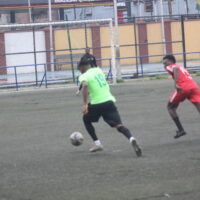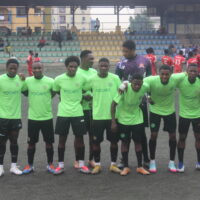They call it the Maracanazo — the final match of the 1950 FIFA World Cup, held in Rio de Janeiro. Host team Brazil was the obvious favorite, set to take on their much-smaller neighbor to the south, Uruguay. Victory was nothing short of inevitable.

The match took place on July 16, in the newly opened Estádio do Maracanã. The official paid attendance was 173,850 — of whom approximately 100 were Uruguayans — but because the stadium’s grandstands had no seats, the actual number might be closer to 210,000. It’s still one of the most-attended sports events of all time.
On the morning of the match, in true Brazilian style, an impromptu carnival began at dawn, with the crowds chanting “Brazil must win!” A samba, “Brazil The Victors,” had been composed, and the mayor of Rio addressed the Brazilian team with a rousing speech: “You, players, who in less than a few hours will be hailed as champions by millions of compatriots! You, who have no rivals in the entire hemisphere! You, who will overcome any other competitor! You, who I already salute as victors!”
That day’s morning edition of O Mundo ran a photo of the Brazilian team on its front page, beneath which a caption read five fateful words:

There was only one problem — they hadn’t played the game yet, and Brazil’s small but mighty opponents weren’t ready to go down without a fight.
When Uruguay’s team captain, Obdulio Varela, saw the newspaper headlines that morning, he bought 20 copies. He laid them out across the floor of his hotel bathroom, where he and the rest of his team proceeded to trample and urinate on them.
Varela played an even bigger role in the locker room minutes before the game began. While coach Juan López wanted his team to keep to their signature defensive strategy, Varela waited for López to leave the room before addressing the team himself. He told them they would surely lose if they played it safe. As the underdogs, they had no choice but to attack and fight back against the odds. Some of Varela’s words are still famous in Uruguay today:

He encouraged them not to mind the crowds; on the field, they’d just be 11 players against 11 players. “Let’s start the show,” he ended.

And start the show they did. While Brazil scored first, Uruguay responded with a goal of their own midway into the second half. Then, with 11 minutes remaining in the match, Uruguay brought the score to 2-1.
As the clock inched closer and closer to the full 90 minutes, the stadium grew more and more silent. The air hung heavy with shock and disbelief.
So upsetting was Uruguay’s victory over Brazil that day that the match became known as the Maracanazo — the Maracanã Blow — and it’s a story that every Uruguayan since then knows from birth, one that’s taken on the stuff of legend.

* * *
Before I moved to Uruguay nearly two years ago, if you’d asked me if I liked soccer, I would’ve told you I loved it — even if I am from the U.S., where “football” refers to something else entirely.
Although I’ve never played a game of soccer in my life, I would’ve proudly told you about my younger brother Grant, who joined his first team when he was 5 and never stopped — playing all the way through high school and college into a couple of Professional Development League teams in California and Tennessee.
But then I met my Uruguayan boyfriend José while we were both traveling through Europe. Just a few months later, we moved to Uruguay together — a country of just 3.5 million people, and a place where there would be no mistaking what sport fútbol refers to.
On one of my first nights in the country, Uruguay’s national team played Venezuela in a World Cup qualifying match, and José’s parents bought tickets for us all to go. Funneling into Montevideo’s Centenario Stadium that night, there was a palpable excitement in the air. Makeshift stalls were set up on every street corner surrounding the stadium, selling Uruguayan flags in every imaginable size.

I remember two distinct moments from that match. The first was taking in the crowd and realizing all the Uruguayan men around us had assumed the same posture for the game. Nearly every one of them had a ubiquitous yerba mate gourd in one hand, as well as a thermos of hot water tucked into the crook of that same elbow, and they drank the mate at a steady pace throughout the game.
But this arrangement still kept their other arm free, which they used to punch the air in frustration, anger, or, on rare occasions — such as the three goals Uruguay scored that night — exultation.

The other moment I remember is when José dared me to yell out “Son of a bitch!” in English the next time the referee made a bad call.
“No way,” I said, looking at his mom and dad sitting next to us. “I can’t do that in front of your parents — I’m still trying to make a good impression.”
I’ll never forget José’s father Marcelo leaning over and saying to me, smiling yet dead serious:

“Exactly,” José said. “Like when we were at school, if we were caught swearing in class, our teacher would always say, ‘Did you forget you’re not at the stadium?’”
That night, I began to wonder if perhaps there are different levels of love for something — and that just as the Norwegians have a specific word, forelsket, for the euphoria one feels at the beginning of love, there needs to be a better word for the passion that Uruguayans have for fútbol.
* * *
Uruguay is, for the most part, an extremely relaxed place to live. Many Uruguayans enjoy nothing more than setting up a pair of beach chairs by the water, passing around their mate, and letting time drift by as the sun sets over the Río de la Plata. Whenever someone asks me if I like Uruguay, I always tell them that what I love most about it is the chilled-out rhythm of life here; life just feels more tranquilo, as they say.
All this tranquility suddenly evaporates when soccer is involved. I simply accepted this about the culture for most of the time I’ve been here; it was only recently, as the World Cup was about to begin in June and Uruguay got ready to cheer on its team in Russia, that I felt compelled to get to the bottom of why soccer is so damn dominant in this country.
“It’s just deeply rooted in the culture here,” José told me when I asked him about it. He told me about the Maracanazo in Brazil, of course (to which my first response was, “How is there not a movie about that?”) as well as an even earlier event that also helped cement the eminence of soccer in Uruguay: the inaugural World Cup in 1930.

FIFA chose Uruguay to host the event after they won the gold medal in men’s soccer at both the 1924 and 1928 Summer Olympics. Uruguay went on to defeat Argentina in the final match and was crowned the first-ever World Cup champions. Most of the tournament’s matches were played in Centenario Stadium — the one I went to myself during my first week in Montevideo. FIFA has even declared the stadium a Historical Monument of World Football — the only one of its kind.
“You’re born knowing these stories and growing up with these legends,” José shared with me. “There are only eight countries that have ever won the World Cup title. You have countries like Germany, Italy, Argentina, and Brazil… and then you’ve got Uruguay. And for such a small country, that’s a huge deal.”

Slowly, I began to get it — to see how soccer went so far beyond a mere sport and became a central part of the country’s cultural identity. These stories of unlikely heroes and unexpected victories are more than legends; they are, perhaps, one of Uruguay’s greatest legacies.

* * *
Weeks before the World Cup kicked off, Uruguayan flags began showing up all over Montevideo — huge flags strung from apartment balconies, and small flags on plastic poles clipped to car windows. Seemingly overnight, nearly every local establishment had been festooned with balloons and streamers, bunting and flags. I started a running list of all the places I saw decorated: the supermarket and pharmacy, schools and hair salons, restaurants, a pet supply store, even the FedEx office.

It was a display of national pride that I’ve rarely witnessed in other countries around the world — perhaps only in England, where I was living when Prince William and Kate Middleton were married, and all of London had turned red, white, and blue.

In the initial group stage, Uruguay was going to face off against host team Russia, as well as Egypt and Saudi Arabia. Their first game against Egypt was scheduled to begin on a Friday at 9 a.m. When I asked José how he was going to manage watching the game at work, he said, “Oh no, my boss gave us the morning off.”
He said this naturally, as if he had expected this to happen. I tried to imagine a situation in the U.S. when the same thing would happen — and failed.
After Uruguay won that game, the stakes were even higher for the second match against Saudi Arabia: If Uruguay won, they would automatically qualify for the knockout round and make it into the top 16 teams.
This time, the game was scheduled for 11 a.m. — slightly too late for José to watch it from home, but he and his boss came up with the next best thing: They borrowed a projector, set up a huge white screen against the wall, and transformed their office into the perfect viewing space, complete with an impressive selection of charcuterie. When I got there to watch the game with them, José told me his boss had even canceled their meetings for that morning, officially establishing the hierarchy of their priorities. If it wasn’t clear before, now I knew: Soccer came first.

With their first two wins in the bag, Uruguay qualified for the knockout round, and their third match — against Russia — felt more like a formality. José didn’t think it would be nearly as big of a deal, so I told him I’d just meet him at his office before the game.
I took my time getting ready and missed my bus. I realized I wouldn’t arrive at José’s office until well into the first half. Never before had I been on the streets in the last few minutes leading up to a game, and never had I seen the streets look so empty. The entire city had ground to a halt. I was the last person waiting at the bus stop; everyone else around me was running, either alone or in hurried groups. For all I knew, the Zombie Apocalypse was about to strike Montevideo.
I boarded the next bus at the exact moment the match started, the radio naturally turned to the game. I leaned my head against the window and settled into my seat for the journey, while the bus followed the city’s winding coastline. Suddenly, less than ten minutes into the game, the Uruguayan announcer’s voice began to scream:

Three times he announced the goal, piercing my heart with every prolonged cry. My head rested against the window no more. I moved to the front seat of the bus, right across from the driver, and leaned forward with an intensity I rarely feel, as though I myself could impel the bus to go faster.
Then, while we were waiting at a red light just one block away from José’s office, the announcer erupted for a second time:

“Hijo de puta!” I yelled out without even thinking, using my favorite among all Spanish swear words, son of a bitch. The driver merely looked over at me and shrugged his shoulders, as if to say, “You’re not the only one stuck on this bus today.”
I stopped and imagined how I might appear to others in that moment, and what I pictured was this: A raving fanatic with her hands thrown up in frustration, identical to all those I’d once witnessed at Centenario Stadium. At last, I knew my transformation was complete — I no longer just loved soccer as an observer, cheering on my brother from the sidelines.
For the first time, I felt like an active participant, caught up in a fervor so much bigger than myself.

* * *
Nearly a week went by before Uruguay’s next game in the knockout round. Tensions were high, and they only shot higher after learning our opponent would be Portugal — none other than Cristiano Ronaldo’s home team and Europe’s reigning champs.
An unusually dense fog had settled over the city for days, which people began to joke was the smoke of three million asados being fired up before the match. José and his group of close friends were hosting a barbecue of their own during the game.
I could hardly believe it when Uruguay scored only seven minutes into the game. Ten minutes into the second half, Portugal evened the score. For a few minutes, the room was silent, on edge. I forgot to eat, letting the fresh steak and sausage coming off the grill be devoured by José and his friends. At least three sets of mate gourds and thermoses sat untouched on the coffee table.

And then it happened — by some miracle of miracles, Uruguay did it again, this time with a single kick that sent the ball sailing straight into the net: a victory goal.
Our humble gathering went crazy. Tables were lifted and pounded against the floor; jackets were torn off and swung in the air; a dogpile was formed, with José’s friend Pedro being the unfortunate one caught at the bottom.
When the post-match interviews began, I raced to record the team’s reactions:

I imagined that was the extent of our celebrating, until José and I were driving home and traffic came to a standstill. For a while, we inched forward at a snail’s pace, horns blaring all around us, until I could start to make out an enormous crowd in the distance.
“Go, go, go,” José said, sensing my anxiety.
I hesitated for all of two seconds, before grabbing my camera and sprinting off into the crowd. As far as I could see in either direction, the boardwalk along Pocitos Beach was packed with people, and they were all wearing flags or waving them high in the air. José eventually met me there, and we were soon swept up into one euphoric sea of blue and white. While every passing car leaned on its horn, the crowd sang its way through a series of chants. I’d heard them all before, but one suddenly took on a whole new meaning:

Nearly 70 years after that pivotal day in Rio de Janeiro, would this year’s World Cup finally hold another Maracanazo upset for Uruguay?
Would they surprise the world yet again and be crowned champions for a third time?
As it would turn out, not this year. Six days after their win over Portugal, Uruguay went on to lose to France in the quarterfinals. But in that singular moment on the boardwalk, as the crowds sang and danced around us and another generation of Uruguayans dreamed of victory, I realized I didn’t even care what the rest of the tournament held — because with a legacy as layered and legendary as Uruguay’s, there was already plenty to celebrate.
And that, Uruguay has taught me, is the true magic of fútbol. It’s a sport where teams thrive against the odds; a sport where anything is possible; and at any moment, a tiny country can make history.

* * *
Candace Rose Rardon is a writer and illustrator based in Montevideo, Uruguay. Her work has appeared on National Geographic’s Intelligent Travel site, BBC Travel, and in Lonely Planet travel anthologies, among others. You can also find Candace on Instagram, where she shares a new illustrated story from around the world every week.
Editor: Ben Huberman
Fact-checker: Ethan Chiel










